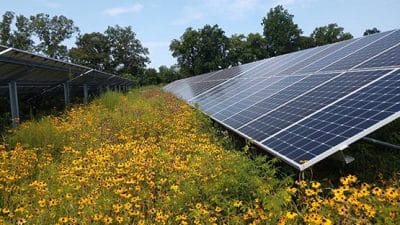
Mosquitoes commonly occur throughout all parts of Virginia. They are not only annoyances but also potential carriers of disease, including the Zika virus. Virginia Cooperative Extension reminds residents that understanding basic mosquito habits and taking steps to disrupt their lifecycles can reduce the threat significantly.
The key is removing the standing or stagnant water where they thrive and reproduce, according to Eric Day, manager of the Virginia Tech Insect Identification Lab.
“The big pest mosquitoes in Virginia are container breeders, so in natural situations their larvae are developing in tree holes, which are holes in trees that collect water,” Day says. “In yards and around businesses, they are going to be breeding in locations such as stopped-up gutters, birdbaths, old containers, tires, or any structure that collects and holds water.”
For more information, refer to the VCE publication, “Mosquitos and Their Control,” or contact your local Virginia Cooperative Extension office.
Day explained that the best prevention method is to rid your yard or business property of those places where mosquitoes breed. Discard old tires and remove or dump containers that collect water. This will cut down on the population of mosquitoes in and around your yard significantly.
When you are in situations where you cannot control the environment, there are steps you can take to ensure personal protection from mosquitoes.
“Personal protection would include wearing long sleeves and long pants to protect your skin from various biting mosquitoes, which is a little bit uncomfortable during the hot summer months, but these mosquitoes can be disease-carrying, so taking these prevention steps can be crucial,” Day says.
As far as over-the-counter protection methods are concerned, Day suggests using products that contain DEET, picaridin, or oil of lemon eucalyptus on exposed skin.
Day does not recommend that people rely on electronic bug zappers or yard sprays. “Zappers are virtually ineffective. And as far as yard sprays go, there are some brands that will give you temporary relief, but again, if the containers have not been taken care of, the mosquito population will be back within a couple of days.”
With the increasing threat of the Zika virus, it is now more important than ever to take proactive measures to protect yourself against mosquitoes, Day says. The mosquitoes that could potentially carry the Zika virus as well as other diseases more commonly carried by mosquitoes in Virginia — including West Nile virus, eastern equine encephalitis, La Crosse encephalitis, and St. Louis encephalitis — are container breeders, so the aforementioned prevention methods are going to help limit exposure to mosquitoes that carry these diseases.
These health concerns underscore the importance of following basic mosquito control methods to keep yourself and those around you — including pets and horses — safe.










